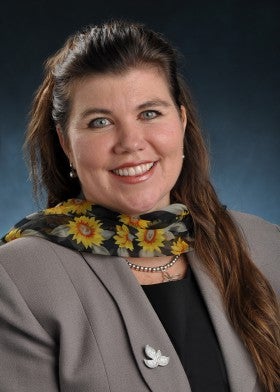Health care, research and funding focus of summer legislative efforts
Health care, biotech research, campus achievements, community partnerships, and higher education funding were among the issues tracked this summer by the University of Colorado's government relations liaisons in Colorado and in Washington, D.C.
health care issues they monitored included proposed legislation for the development of biotechnology drugs, funding for the Veterans Administration Medical Center in Denver, stem cell research, and efforts to increase the number of physicians practicing in rural areas, said Tanya Kelly-Bowry, vice president for state and federal government relations.
In addition, both state and federal government relations staff coordinated campus tours for members of Colorado's congressional delegation so they could meet with chancellors and other campus leaders, and get up-close views of some of the projects being spearheaded by CU faculty researchers.
Kelly-Bowry, who oversees CU's lobbying efforts in Denver and Washington, D.C., said the outreach campus tours allowed state and federal lawmakers to view facilities and engage faculty researchers in discussions about their work. The tours also gave government relations staff opportunities to raise awareness about ongoing stem cell and other research, biotechnology developments, energy partnerships and similar leading-edge work by CU researchers.
"We appreciate all the support each campus gives us in making these opportunities available for our state and federal leaders," Kelly-Bowry said.
Other efforts by the university's government relations team included indentifying funding opportunities for CU-Boulder's JILA and the Center of the American West, UC Denver's Linda Crnic Institute for Down Syndrome, and other research centers and institutes around the CU system.
In Washington, D.C., the university's federal government relations representatives tracked the CU system's earmark requests in fiscal year 2010 bills, monitored the Clean Energy bill and its impact on CU, and worked with Denver-based firm Brownstein Hyatt Farber Schreck LLP to identify homeland security funding opportunities for the University of Colorado at Colorado Springs.
In addition, federal government relations Executive Director David Sprenger, who is based in Washington, D.C., and Director Lynne Lyons, who is based mostly in Denver, worked with all four CU campuses to generate ideas for fiscal year 2011 appropriation requests.
Colorado congressional leaders met with Lyons and other government relations staff over the summer to discuss CU research and partnerships with the National Renewable Energy Laboratory (NREL) in Golden, and other energy research initiatives. In June, Sen. Michael Bennet, D-Colo., and CU-Boulder Chancellor Phil DiStefano met with members of the state's Energy Collaboratory to discuss how CU and its partners are working with NREL to develop new energy technologies.
For his part, Sen. Mark Udall, D-Colo., met with UC Denver Chancellor M. Roy Wilson, M.D., Vice Chancellor for Health and Dean of the School of Medicine Richard Krugman, M.D., and Jack Westfall, M.D., who oversees a rural-track program for medical students. Government relations staff facilitated the meeting, where participants discussed Udall's proposed legislation to increase the number of physicians in rural communities.
In July, UCCS Chancellor Pamela Shockley-Zalabak and Kelly-Bowry met with Don Elliman, the governor's newly appointed chief operating officer, and several other higher education leaders from southern Colorado to discuss the Southern Colorado Innovation Collaboration.
At the state level, CU's government relations office, led by Director Kirsten Castleman, also facilitated campus tours for Colorado lawmakers, who met with chancellors and other university leadership and toured facilities such as the Anschutz Medical Campus and the Auraria Higher Education Center.
Though the Colorado General Assembly is out of session, Kelly-Bowry said members continue to meet in several interim committees of interest to CU, including the Long-Term Fiscal Stability Commission, whose mission it is to consider and attempt to solve Colorado's "fiscal crisis."
"Funding higher education is a large part of this conversation," Kelly-Bowry said.
Other legislative committees that met over the summer include the School Finance Interim Committee, the health care Task Force, and the interim committee discussing Pinnacol Assurance issues.
Aug. 5, the effective date for many 2009 legislative bills, also marked the end of the 90-day period after final adjournment of the general assembly that allows submissions of referendum petitions.
"We have begun sending e-mails out with final summaries and effective dates for all legislation our office tracked during the session," Kelly-Bowry said.
For his part, CU President Bruce D. Benson met with state legislators during his annual summer outreach visits. In addition, Benson spoke at Rotary Clubs, interviewed with local newspapers, radio and TV stations to educate Colorado communities about CU and higher education in general, and met with elected officials, donors, alumni and other higher education supporters at community receptions. In July, Benson visited Vail, Aspen, Silverthorne and Steamboat Springs, and several Denver-area communities.


